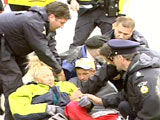
Government by injunction: an abuse of the court's process
July 9, 2006 in News
On July 7, 2006, a BC Supreme Court judge ordered that Betty Krawczyk, 77, be held in jail until September 15, 2006. That is the date of her “trial” on allegations that she breached a court injunction order in a civil action commenced by the companies constructing the Sea to Sky Highway improvements against Dennis Perry and Bruce MacArthur. Betty is not a party in that case.
Betty was arrested after repeatedly pitching a small tent in the path of excavation equipment to protest the government’s decision to destroy a unique and sensitive ecosystem known as Eagleridge Bluffs.
Here are some learned comments on the practice of “government by injunction”:
…………
“Government by injunction is a thing abhorrent to the laws of England and this province.”
Ontario Court of Appeal
“Having obtained an injunction in protection of a private right, the plaintiff seeks to turn it into a public criminal prohibition against the whole community, on the ground that there would be otherwise a flouting of the due course of justice. Can it be doubted that the proposition carries its own condemnation? It is indeed an ingenious argument for securing the aid of the criminal powers of the equity court against any persons whom the court can be induced to regard as having affronted its dignity or having interfered with the due performance of its functions.” Bora Laskin, 1937, Canadian Bar Review
“This has been a maliciously effective, pseudo-legal way of breaking the back of legitimate moral process.” Martin Luther King, Jr., 1963, commenting on the injunction that landed him in the Birminingham Jail.
“There is today the grave question of whether public order should be maintained by the granting of an injunction…” Southin J.A., 1990, Everywoman’s case, BC Court of Appeal
[This is], in essence, a request for the court to craft a proscriptive law binding on all citizens respecting certain activities. It is not the assertion of a civil claim at all, but the adaptation of the mechanics of a civil claim for the purpose of legislating, by way of injunction, a form of ad hoc criminal law…I think this proceeding amounts to a kind of officially induced abuse of process.”, McEwan J., 2003, BC Supreme Court

Why bother with laws at all, when companies and governments can employ injunctions to arrest people? Let’s identify bothersome activities and have a judge enjoin John Doe, Jane Doe and everyone else from engaging in them. Let’s then authorize the police to enforce the injunctions by arrest, then have the judges convict people of criminal contempt of court for disobeying their orders. That way we can avoid all the procedural technicalities thrown up by the Criminal Code, troublesome impediments to justice like formal charges, bail provisions, jury trials, maximum sentence lengths, etc. In fact, we don’t need a Criminal Code at all-just have the judges make a few ad hoc criminal laws by way of injunctions, with breaches punishable by contempt of court…enjoin John and Jane Doe from committing theft, assault, murder etc….
posted by Cameron Ward
At least 22 dead at the hands of BC police in last four years
July 9, 2006 in Opinion
What do Kevin St. Arnaud, Kyle Tait and Ian Bush have in common? All three unfortunate youths were unarmed when they were shot and killed by British Columbia police officers. Each fatality was investigated by the police themselves. No charges have been laid. Although a coroner’s inquest is mandatory whenever someone in B.C. dies while detained by or in the custody of a peace officer, no inquest has yet been held in any of these cases.
This is unacceptable.
……………..
The following list of people who have died while in police detention or custody in B.C. since May of 2002 has been gleaned from media accounts. Many of the media accounts are based on information provided by police. This list does not include deaths occurring in jail from natural causes or suicide. It may not be exhaustive, as some incidents may not have been reported in the press or may otherwise have escaped our attention.
1. Benny Matson; May 2002, Vancouver
Matson knocked over a motorcycle, was pursued and kicked in the head by one or more VPD officers. A coroners inquest was held and an OPCC complaint was dismissed.
2. John MacKay; July 2002, Vancouver
Mackay died in the Vancouver Jail of “blunt trauma injuries suffered from falling over and striking his head.”
3. Christopher Eklund; August 2002, Vancouver
Eklund “died accidentally after a struggle with Vancouver police” when his “heart stopped as a result of neck compression”.
4. Tom Stevenson; December 2002, Vancouver
Stevenson was sitting in a stolen vehicle the VPD had disabled. Two VPD members approached the vehicle. After Stevenson ignored their commands to get out, the police fired six shots into the vehicle, killing Stevenson instantly. At the coroner’s inquest, police stated that Stevenson had reached for a plastic gun. The plastic gun was photographed lying outside the vehicle near the left rear wheel. An inquest determined the death to be a homicide and the jury’s recommendations included a recommendation that the police not be allowed to investigate themselves. A civil suit is pending.
5. Lorraine Moon; February 2003, Cormorant Island
Moon was “brandishing a knife” when she was shot by an RCMP officer.
6. Terrence Hanna; April 2003, Burnaby
Hanna died after the RCMP shot him with a Taser, a “non-lethal” weapon that emits 50,000 volts of electricity and is designed to inflict excruciating pain and temporarily incapacitate the subject. (188 North Americans have died after being Tasered by police. No independent safety testing of Tasers has yet been done in Canada).
7. Keyvan Tabesh; July 2003, Port Moody
Tabesh was shot by plainsclothes Port Moody police after he had smashed a car window with a machete. An inquest was held.
8. Clay Willey; July 2003, Prince George
Willey died after Prince George RCMP repeatedly shot him with a Taser.
9. Joe Pagnotta; February 2004, Victoria
Pagnotta was shot by Victoria police after he “came at officers with a knife”.
10. Roman Andreichikov; May 2004, Vancouver
Andreichikov, unarmed, died after he was Tasered by VPD.
11. Robert Bagnell; June 2004 Vancouver
Bagnell, unarmed, was lying on his bathroom floor in medical distress when several VPD officers repeatedly shot him with a Taser.
12. Majencio Camaso; July 2004, Saanich
Camaso was shot by Victoria police after he came at them with a pipe and crowbar. An inquest was held and an OPCC complaint filed.
13. Dean Andrusyk; September 2004, Vancouver
Andrusyk was shot by VPD officers when he “pulled a knife”.
14. Dwight Caron; November 2004, Vancouver
Caron died of trauma in the New Westminster jail.
15. Gerald Chenery; December 2004, Vancouver
Chenery was shot 12 times by two rookie VPD officers. David Eby represented the family at the inquest.
16. Kevin St. Arnaud; December 2004, Vanderhoof
St. Arnaud, unarmed, was shot three times by an RCMP officer while both were in a field.
17. Unidentified man, 49, February 6, 2005, Vancouver
This Calgary man died after a “brief struggle” with the VPD.
18. Gurmeet Sandhu; June 2005, Surrey
Sandhu died after Surrey RCMP repeatedly shot him with a Taser.
19. Stephen Hanaghan; June 2005, Kamloops
20. Kyle Tait; August 2005, New Westminster
Tait was one of five teenagers in a stolen car stopped by New Westminster police. Cst. Sweet fired three shots into the vehicle, one of which killed Tait.
21. Ian Bush; October 2005, Houston
Bush, unarmed was shot in the head by an RCMP officer. The family’s lawyer is Howard Rubin.
22. Ryan Snopek; January 1, 2006, Cranbrook
Snopek died from bleeding on the brain caused by a “crack in the skull”.
posted by Cameron Ward
Government by injunction: an abuse of the court's process
May 26, 2006 in Opinion
“Government by injunction is a thing abhorrent to the laws of England and this province.”
Ontario Court of Appeal
“Having obtained an injunction in protection of a private right, the plaintiff seeks to turn it into a public criminal prohibition against the whole community, on the ground that there would be otherwise a flouting of the due course of justice. Can it be doubted that the proposition carries its own condemnation? It is indeed an ingenious argument for securing the aid of the criminal powers of the equity court against any persons whom the court can be induced to regard as having affronted its dignity or having interfered with the due performance of its functions.” Bora Laskin, 1937, Canadian Bar Review
“This has been a maliciously effective, pseudo-legal way of breaking the back of legitimate moral process.” Martin Luther King, Jr., 1963, commenting on the injunction that landed him in the Birminingham Jail.
“There is today the grave question of whether public order should be maintained by the granting of an injunction…” Southin J.A., 1990, Everywoman’s case, BC Court of Appeal
[This is], in essence, a request for the court to craft a proscriptive law binding on all citizens respecting certain activities. It is not the assertion of a civil claim at all, but the adaptation of the mechanics of a civil claim for the purpose of legislating, by way of injunction, a form of ad hoc criminal law…I think this proceeding amounts to a kind of officially induced abuse of process.”, McEwan J., 2003, BC Supreme Court

Why bother with laws at all, when companies and governments can employ injunctions to arrest people? Let’s identify bothersome activities and have a judge enjoin John Doe, Jane Doe and everyone else from engaging in them. Let’s then authorize the police to enforce the injunctions by arrest, then have the judges convict people of criminal contempt of court for disobeying their orders. That way we can avoid all the procedural technicalities thrown up by the Criminal Code, troublesome impediments to justice like formal charges, bail provisions, jury trials, maximum sentence lengths, etc. In fact, we don’t need a Criminal Code at all-just have the judges make a few ad hoc criminal laws by way of injunctions, with breaches punishable by contempt of court…
posted by Cameron Ward
Judge grants company injunction, rejects demonstrators' claims
May 15, 2006 in News

In oral reasons for judgment pronounced today, Mr. Justice Grist has granted an injunction to Peter Kiewit Sons Co. to retrain demonstrators from physically obstructing their planned construction activities at Eagleridge Bluffs. He dismissed an application for an injunction sought by members of the Eagleridge Bluffs & Wetlands Preservation Society in a claim that alleged that the contractor hadn’t satisfied the preconditions to commencing construction.
We have instructions to apply for leave to appeal to the Court of Appeal and to seek a stay pending the appeal. The applications will be heard by the Court of Appeal on Tuesday, May 30, 2006.
UPDATE: On May 24, 2006, Grist J. granted an “enforcement order’ authorizing the police to do what they already had the power to do-arrest alleged violators of the injunction order. On May 25, 2006, West Vancouver police arrested 23 people and released them on their promises to appear in BC Supreme Court on June 9, 2006. Nobody has been charged with an offence, however. The arrestees will attend to see what, if anything, the BC Attorney General and the Court decide to do with them.
posted by Cameron Ward
Judge reserves decision in Eagleridge dispute
May 12, 2006 in News

After hearing 6 1/2 days of submissions triggered by an application for an injunction to restrain people from demonstrating at Eagleridge Bluffs, Mr. Justice William Grist has reserved judgment in the case.
He is expected to deliver his decision at 12:00 noon on Monday, May 15, 2006 at the Law Courts, 800 Smithe Street, Vancouver, BC.
For more on the background to this case, please go to www.eagleridge.ca







 Follow this site using RSS
Follow this site using RSS

